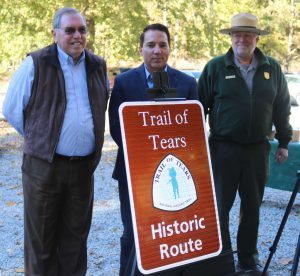Backpackers trekking the Appalachian Trail north to Maine or paddlers pulling out of the Nantahala River will get a reminder of history and the tragic Trail of Tears that the native Cherokee were forced to march west to Oklahoma nearly two centuries ago.
North Carolina got its first National Historic Trail marker for the Trail of Tears at the intersection with the Appalachian Trail at the Nantahala Outdoor Center in Swain County with an unveiling and dedication last week.
About 50 people, including Eastern Band of Cherokee members, officials with the National Park Service and the National Forests in North Carolina, volunteers from the North Carolina chapter of the National Trail of Tears Association, the Nantahala Hiking Club, the Appalachian Trail Conservancy and other groups all came together to dedicate the sign, vowing to never forget the dark chapter in American history.

The Cherokee originally lived at a town on the banks of the Nantahala where kayakers now practice their moves on the free-style course beneath the pedestrian bridge. The U.S. military rounded up those residents, who fated to walk the furthest on the Trail of Tears to Oklahoma during the Removal of 1838.
“We all love the majesty of these mountains, rich not only with beauty but with our culture, our story,” said Principal Chief Richard Sneed of the Eastern Band. “Our story is a cautionary tale for our country, When the laws and treaties become just words on paper, when greed overpowers righteousness, you have what happened to our people 180 years ago. But we are people who refused to be destroyed.”
The BRNHA is proud to have supported the N.C. Chapter of the Trail of Tears Association in putting signs at key sites of the Cherokee Removal in our mountains.


